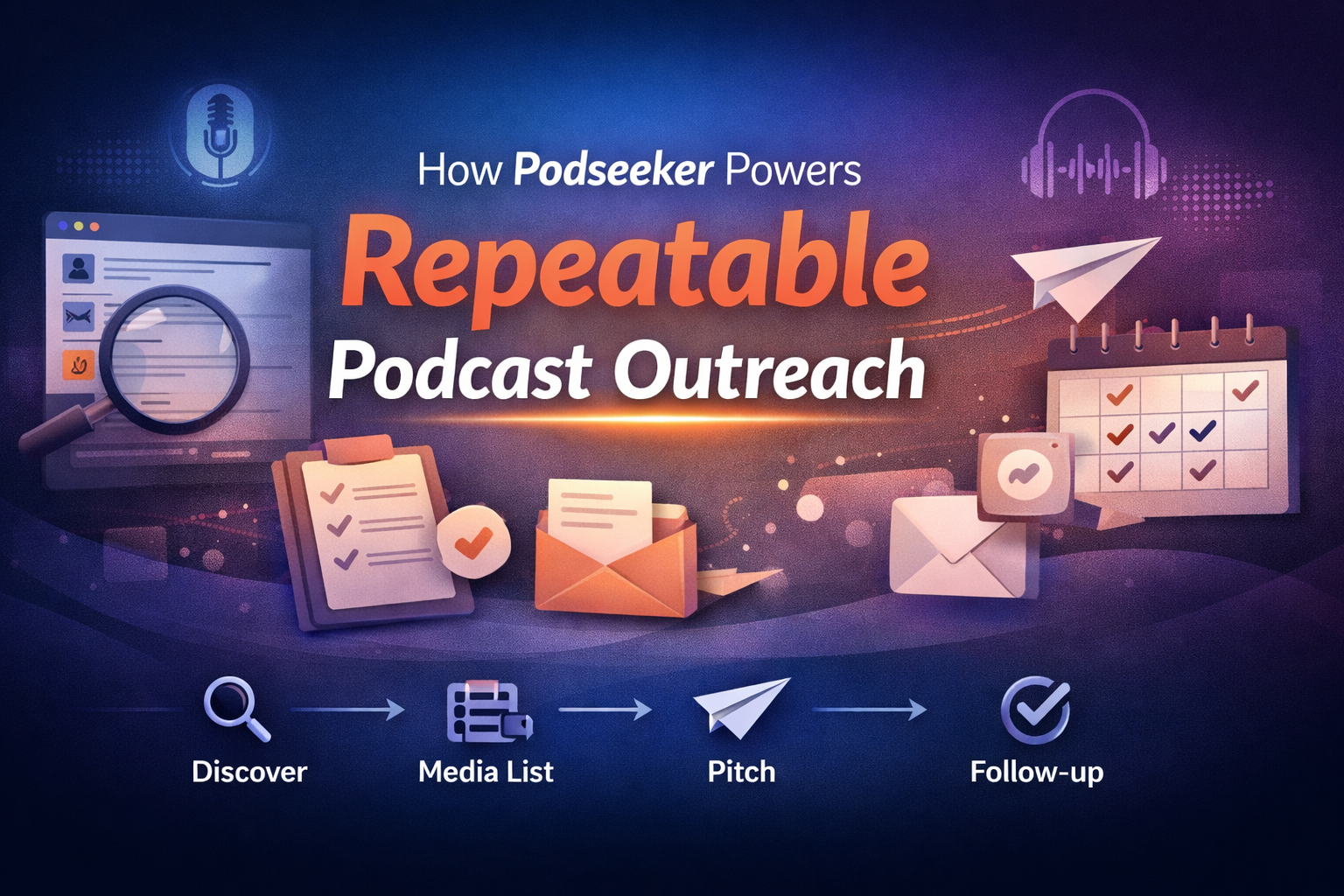Alright PR pros, let's talk data. You know that finding the right podcasts to pitch is crucial, but how do you really evaluate if a show is a good fit beyond just the topic? You need metrics. Solid data points that help you answer: Is this podcast truly successful? Is it reaching the right people? Is it worth my client's valuable time?
Many people immediately ask how to find out how many listeners a podcast has, and while that's important (and notoriously tricky to find accurately), it's only one piece of the puzzle. A truly effective podcast metrics search goes deeper.
This guide explores the key metrics PR professionals should look for when evaluating podcasts for outreach campaigns, how to find them, and how tools like Podseeker streamline this crucial research process.
Why Go Beyond Listener Numbers? The Metrics That Matter for PR
Listener estimates are a great starting point (we dedicated a whole article to finding them here), but relying solely on that number can be misleading. A podcast might have decent listener numbers but low engagement, or target the wrong demographic entirely. To truly tell if a podcast is successful for your specific PR goals, you need a broader view.
Here are the key podcast metrics PR pros should be tracking:
- Audience Size Estimates: Yes, still important! Provides a baseline for potential reach.
- Audience Demographics & Location: Who are they actually reaching? (Age, gender, geographic concentration). Crucial for ensuring audience alignment.
- Social Media Reach & Engagement: How big and active is their community on platforms like Instagram, YouTube, Twitter, etc.? High follower counts and engagement suggest influence beyond just the audio.
- Activity & Consistency (Recency): Is the podcast publishing regularly? A show with great historical stats but no new episodes in months isn't a viable target.
- Guest Acceptance: Do they actually feature guests relevant to your client's niche?
- Ratings & Review Quality: Forget the number of ratings. Read recent reviews – are listeners engaged, knowledgeable, and aligned with your target profile? High ratings with thoughtful comments are a good sign.
- Contact Availability & Type: Can you actually reach them? Is it a direct host email, a producer contact, or just a generic info box or form? (Podseeker provides verified contacts and flags contact forms!)
- Estimated Ad Costs / Sponsorship Clues: (Relevant for podcast advertising metrics research, but also a PR signal). Do they run ads? What are the estimated costs (like those provided in Podseeker)? High ad rates or sponsors aligned with your client's industry can indicate a valuable, commercially successful show and audience.
Looking at this suite of metrics gives you a much more holistic picture of a podcast's influence, relevance, and viability for your outreach campaign than listener numbers alone.
How to Track Podcast Metrics: The Challenge & The Solution
Okay, knowing what metrics to look for is one thing. Actually finding and tracking them across potentially hundreds of podcasts is another beast entirely. Manually performing a comprehensive podcast metrics search for each show involves:
- Scouring podcast websites for vague clues.
- Checking multiple social media platforms.
- Trying to interpret chart rankings across different apps.
- Digging through directories like Apple Podcasts or Spotify (which offer limited metrics publicly).
- Using separate tools for listener estimates (like Rephonic or Podchaser) if you subscribe to them.
- Manually compiling all this data in a spreadsheet... It's a time-consuming nightmare.
The Podseeker Workflow: Integrated Podcast Metrics Search
This is where a dedicated Podcast Database built for PR, like Podseeker, becomes indispensable. We centralize the podcast metrics search process by providing key data points directly within our Search Engine:
- Unified View: See estimated listener numbers, social follower counts (YouTube, Instagram), location data, gender skew estimates, ratings, categories, activity status, guest status, and verified contact info all on one platform, often on the search results page itself.
- Advanced Filtering: Don't just search by keyword. Filter your results based on these metrics! Find shows with ">10k Listeners," or ">5k YouTube Subs," or located specifically in the "USA," etc. This lets you build lists based on the exact metric criteria that define a "successful" podcast for your campaign.
- Estimated Ad Costs: We provide AI-driven estimates for 30s and 60s ad spots, giving you another data point for evaluating a show's commercial standing and potential sponsorship value (useful context even if you're pitching guests, not ads).
- Efficiency: Stop jumping between dozens of tabs. Perform your research, evaluate metrics, find contacts, and even craft pitches using integrated tools, all within Podseeker.
(Image: Screenshot of Podseeker search results or podcast detail page highlighting multiple metrics - e.g., listeners, socials, location, contacts)
By bringing these disparate podcast metrics together in a searchable, filterable format, Podseeker transforms evaluation from scattered guesswork into a streamlined, data-informed process.
Wrapping It Up: Beyond Listeners for Smarter Outreach
So, how do you tell if a podcast is successful and right for your PR client? Look beyond just the estimated listener count. A comprehensive podcast metrics search involves evaluating audience demographics, social reach, activity, contact availability, engagement signals, and even advertising indicators.
While finding this data manually is tedious, platforms like Podseeker provide PR professionals with the integrated tools and data needed to efficiently evaluate podcasts based on the full spectrum of relevant metrics, leading to smarter targeting and more successful outreach campaigns.
Ready to start your data-driven podcast search? Explore Podseeker today.
Need a refresher on just the listener number aspect? Check out our guide: How to Find Out How Many Listeners a Podcast Has (PR Guide 2025).
Try us risk free with a FREE 7 days trial.








